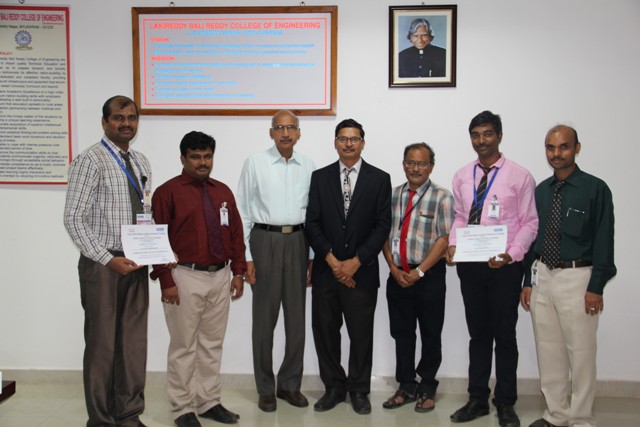CISCO NETWORKING ACADEMY
COURSES & CERTIFICATIONS
Our courses are designed to help students prepare for entry-level career opportunities, continuing education, and globally recognized certifications. Each course is supported by classroom instruction, online assessments, hands-on labs, and interactive learning tools to help students succeed.
IT ESSENTIALS :
The IT Essentials: PC Hardware and Software curriculum v4.0 provides an introduction to the computer hardware and software skills needed to help meet the growing demand for entry-level information and
communication technology (ICT) professionals. The curriculum covers the fundamentals of PC technology, networking, and security, and also provides an introduction to advanced concepts.
Students who complete this course will be able to describe the internal components of a computer, assemble a computer system, install an operating system, and troubleshoot using system tools
and diagnostic software. Hands-on labs and Virtual Laptop and Virtual Desktop learning tools help students develop critical thinking and complex problem-solving skills. Cisco Packet Tracer simulation-based
learning activities promote the exploration of network and networking security concepts and allow students to experiment with network behavior.
PC Hardware and Software is a hands-on, career-oriented e-learning solution with an emphasis on practical experience to help students develop fundamental computer skills, along with essential
career skills. The curriculum helps students prepare for entry-level ICT career opportunities and the CompTIA A+ certification, which helps students differentiate themselves in the marketplace to
advance their careers. In addition, the course provides a learning pathway to the CCNA Discovery and CCNA Exploration curricula.
Routing & switching
"The Cisco Routing & switching curriculum provides a comprehensive overview of networking; from fundamentals to advanced applications and services. It is based on a top-down approach to networking that
is popular in many colleges and universities. This course emphasizes theoretical concepts and practical application, while providing opportunities for students to gain the skills and hands-on experience
needed to design, install, operate, and maintain networks in small-to-medium businesses, as well as enterprise and service provider environments.
Routing & switching offers in-depth theory, challenging labs, and a detailed overview of protocol operations. It is designed for students with advanced problem-solving and analytical skills,
such as degree candidates in engineering, math, or science, or for working professionals who would like to advance their careers or gain certification. CCNA Exploration was designed to be integrated
into technology curricula or continuing education programs at postsecondary institutions such as technical schools, colleges, and universities." - Cisco
The Routing & switching curriculum consists of four courses:
Routing & switching Course Outline
|
Chapter |
Network Fundamentals |
Routing Protocols |
LAN Switching |
Accessing the WAN |
|
and Concepts |
and Wireless |
|||
|
1 |
Living in a Network Center World |
Introduction to Routing and Packet Forwarding |
LAN Design |
Services in a Converged WAN |
|
2 |
Communicating over the Network |
Static Routing |
Configure a Switch |
PPP |
|
3 |
Application layer functionality and Protocols |
Introduction to Dynamic Routing Protocols |
VLANs |
Frame Relay |
|
4 |
OSI Transport Layer |
Distance Vector Routing Protocols |
Implement VTP |
Network Security |
|
5 |
OSI Network Layer |
RIP version 1 |
Implementing Spanning Tree Protocols |
Access Control Lists (ACLs) |
|
6 |
Addressing the Network-IPv4 |
VLSM and CIDR |
Implementing Inter-VLAN Routing |
Providing Teleworker Services |
|
7 |
Data Link Layer |
RIPv2 |
Configuring a Wireless Router |
Implementing IP Addressing Services |
|
8 |
OSI Physical Layer |
The Routing Table: A Closer Look |
|
Troubleshooting Networks |
|
9 |
Ethernet |
EIGRP |
|
|
|
10 |
Planning and Cabling Networks |
Link-State Routing Protocols |
|
|
|
11 |
Configuring and Testing your Network |
OSPF |
|
|
Subnetting:
A short IP subnetting tutorial. Subnetting is explained with examples. Post assessment exercises after the course gives you hands on practice.By the end of this subnetting course, you should be able to:
Industry Standard Certification
The Routing & switching curriculum pre¬pares students for the Cisco CCNA® network associate certification exam. CCNA is the industry standard, foundational certification for networking careers. Students need to complete all four courses of Routing & switching to fully prepare for the CCNA exam.
CCNA SECURITY:
The Cisco CCNA Security curriculum provides a next step for individuals who want to enhance their CCNA-level skill set and help meet the growing demand for network security professionals. The curriculum
provides an introduction to the core security concepts and skills needed for the installation, troubleshooting, and monitoring of network devices to maintain the integrity, confidentiality, and availability
of data and devices. CCNA Security helps prepare students for entry-level security career opportunities and the globally recognized Cisco CCNA Security certification.
This course is a hands-on, career-oriented e-learning solution with an emphasis on practical experience to help students develop specialized security skills, along with critical thinking and
complex problem solving skills. CCNA Security is a blended curriculum with both online and classroom learning. Students who enroll in CCNA Security are expected to have CCNA-level networking concepts
knowledge and skills, along with basic PC and Internet navigation skills.
While there are no required course prerequisites, students are encouraged to complete the CCNA Discovery or CCNA Exploration
curricula to acquire the fundamental CCNA-level routing and switching skills needed for success in this course. CCNA Security provides a next step for CCNA Discovery or CCNA Exploration students
who want to expand their CCNA-level skill set to prepare for a career in network security.
CCNp:
The Cisco CCNP curriculum is designed for students seeking career oriented, enterprise-level networking skills. CCNP helps students develop the skills needed to succeed in ICT-related degree and diploma
programs and prepare for the Cisco CCNP certification. It provides a theoretically rich, hands-on learning experience covering advanced routing, switching, and troubleshooting skills. CCNP provides
a next step for CCNA Discovery or CCNA Exploration students who want to build on their CCNA-level skill set to further a career in computer networking.
CCNP equips students with the knowledge and skills needed to plan, implement, secure, maintain, and troubleshoot converged enterprise networks. The CCNP curriculum was designed to reflect the
job skills and responsibilities that are associated with professional-level job roles such as network engineer, systems engineer, network support engineer, network administrator, network consultant
, and system integrator.
The CCNP curriculum consists of three courses: CCNP ROUTE: Implementing IP Routing, CCNP SWITCH: Implementing IP Switching, and CCNP TSHOOT: Maintaining and Troubleshooting IP Networks.
Cisco Packet Tracer :
The Cisco Packet Tracer e-learning software was developed to help Networking Academy students gain practical networking technology skills in a rapidly changing environment.
Packet Tracer is a powerful network simulation program that allows students to experiment with network behavior and ask “what if” questions. As an integral part of the Networking Academy comprehensive
learning experience, Packet Tracer provides simulation, visualization, authoring, assessment, and collaboration capabilities and facilitates the teaching and learning of complex technology concepts.
Packet Tracer supplements physical equipment in the classroom by allowing students to create a network with an almost unlimited number of devices, encouraging practice, discovery, and troubleshooting.
The simulation-based learning environment helps students develop 21st century skills such as decision making, creative and critical thinking, and problem solving.
Packet Tracer complements the Networking Academy curricula, allowing instructors to easily teach and demonstrate complex technical concepts and networking systems design. The software is available
free of charge to all Networking Academy instructors, students, and alumni.
Cisco Events :
 Dept of CSE conducted a Two Week workshop on "“Cisco Cyber security Learn-A-thon” from 16-07-2018 to 30-07-2018
Dept of CSE conducted a Two Week workshop on "“Cisco Cyber security Learn-A-thon” from 16-07-2018 to 30-07-2018
 "CCNA Training Program" from 22-03-2016 to 10-04-2016 organized by Dept. of CSE & IT.
"CCNA Training Program" from 22-03-2016 to 10-04-2016 organized by Dept. of CSE & IT.
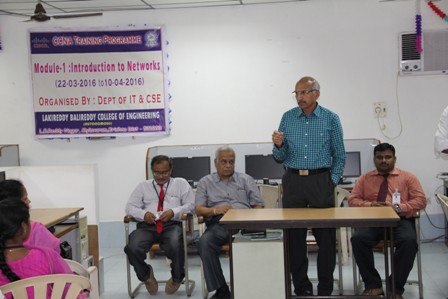
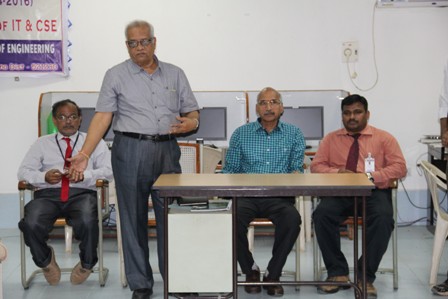
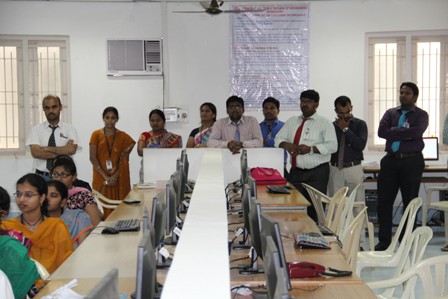
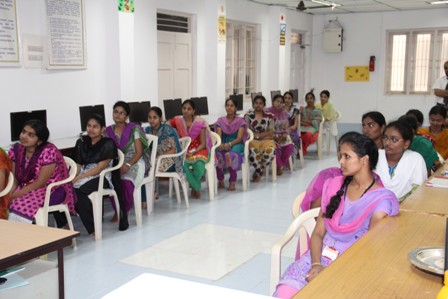
 Management & Director congratulating the Faculty for successful completion of Cisco Networking Instructor Training Program conducted at Bhubaneswar.
Management & Director congratulating the Faculty for successful completion of Cisco Networking Instructor Training Program conducted at Bhubaneswar.
